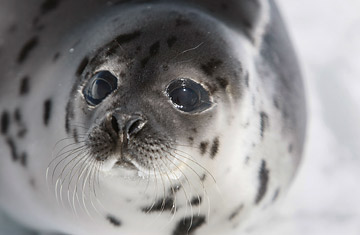
A Harp seal pup lays on an ice floe in the Gulf of Saint Lawrence near Charlottetown, Canada.
When Canadian Prime Minister Stephen Harper met with E.U. leaders in Prague on May 6 for a summit to launch talks on a free trade agreement, they should have been exchanging handshakes and back slaps. Instead, they were straining to prevent their summit from being hijacked by an unlikely agitator: the baby seal.
How could the cute and fluffy creature cause so much trouble? On Tuesday, the day before the summit, the European Parliament passed a vote in Strasbourg to ban imports of seal products into the European Union — mainly from Canada. MEPs voted by a massive 550 to 49 to ban seal products — from soft pelts to Omega-3 health supplements made from seal oil — in time for the next commercial seal hunt season, in Spring 2010. (See pictures of life beneath Antarctic ice.)
It is also just in time for the European elections next month. The Parliament effectively closes down Friday as campaigning begins across the E.U.'s 27 member states. Unlike seals, who have permanent residence on any list of the cutest things in the world, MEPs suffer from an image problem: the public views them as ineffectual and anonymous, and turnout at the upcoming elections is expected to be a record low. By standing up for beautiful baby seals — and backing a cause championed by the likes of Paul McCartney and Pamela Anderson — MEPs perhaps thought they could strike a chord with jaded voters.
"This law is a victory for people power," said British Labour MEP Arlene McCarthy, who helped steer the ban through the Parliament, in a statement. "The vast majority of people across the U.K. and Europe are horrified by the cruel clubbing to death of seals."
The vote also earned praise from animal welfare groups, who say that seals are sometimes skinned while still conscious. "The Parliament has hammered the final nail in the coffin of the sealing industry's market in the E.U.," said Lesley O'Donnell, from the International Fund for Animal Welfare. "The decision will save millions of seals from a horrible fate," added Humane Society International director Mark Glover.
But the ban has left Canada seething at what it sees as sanctimonious grandstanding. At Wednesday's summit, Canadian Trade Minister Stockwell Day said the decision "was based on people's feelings rather than hard facts," noting that Canada went to great lengths to ensure a humane, well-regulated and sustainable cull, and that it no longer allows the clubbing of baby seals while they still have their white coats. (See pictures of Canada.)
Newfoundland and Labrador Premier Danny Williams also pointed to Denmark's annual whale culls and said Europe had no business lecturing others on animal slaughter. "The hypocrisy of Europeans on this is unbelievable," he said. "Europeans should have a good, hard look at themselves."
Although the leaders spoke at the summit about how their pact would boost annual commerce between Canada and the E.U. by around $27 billion, they were also contemplating that the seal ban could lead to a major trade tiff. Canada has already promised to challenge the ban at the World Trade Organization — and stands a good chance of overturning it, since WTO rules only allow prohibitions based on health and safety.
The E.U. imports around $5 million of Canada's seal skins each year. But Canada says the impact of the impending ban is already being felt. Top seal pelts now fetch $14, a steep drop from the $105 they pulled in three years ago. And the Canadian hunt has killed less than 60,000 seals out of its 330,000 quota for 2009, down from over 220,000 last year.
Many of the 6,000 fishermen in Newfoundland and Labrador are indigenous Inuit people, who hunt seals to supplement their incomes and say the ban threatens their livelihood. Before the vote, an Inuit delegation from Canada's northern Nunavut territory appealed to MEPs to reconsider the ban. The MEPs did amend the ban to exempt seal products coming from traditional Inuit hunts. But Inuit leaders warned it would still kill their market. "This exemption is nothing but a ruse," Nunavut Environment Minister Daniel Shewchuck said in a statement. "With an outright ban on commercial trade, the price of skins will collapse, and with it one of the few ways in which the Inuit people are able to bring cash into their communities."
But the Inuit may feel most aggrieved by another aspect of the ban: It will remain legal for Europe's fishermen to cull seals for fish stock management. (And they can continue to sell the resulting seal products within the E.U.). Adult seals get through huge amounts of fish on a daily basis, and buried within the Parliament ban is a recognition that seals often have to be hunted to ensure the sustainability of fisheries in some areas. Indeed, the population of seals on Canada's east coast is now 6 million, three times what it was in the 1970s, making them a major threat to fish stocks. (See TIME's Pictures of the Week.)
British Liberal MEP Diana Wallis tried to make this point in the Parliament debate on Tuesday, but her pleas were ignored. "Seals are very beautiful marine animals — in fact, I have realized during this process that they have great PR," she said. "But to some they are the rats of the sea." That may be true, but it's hardly a vote-winning slogan.
